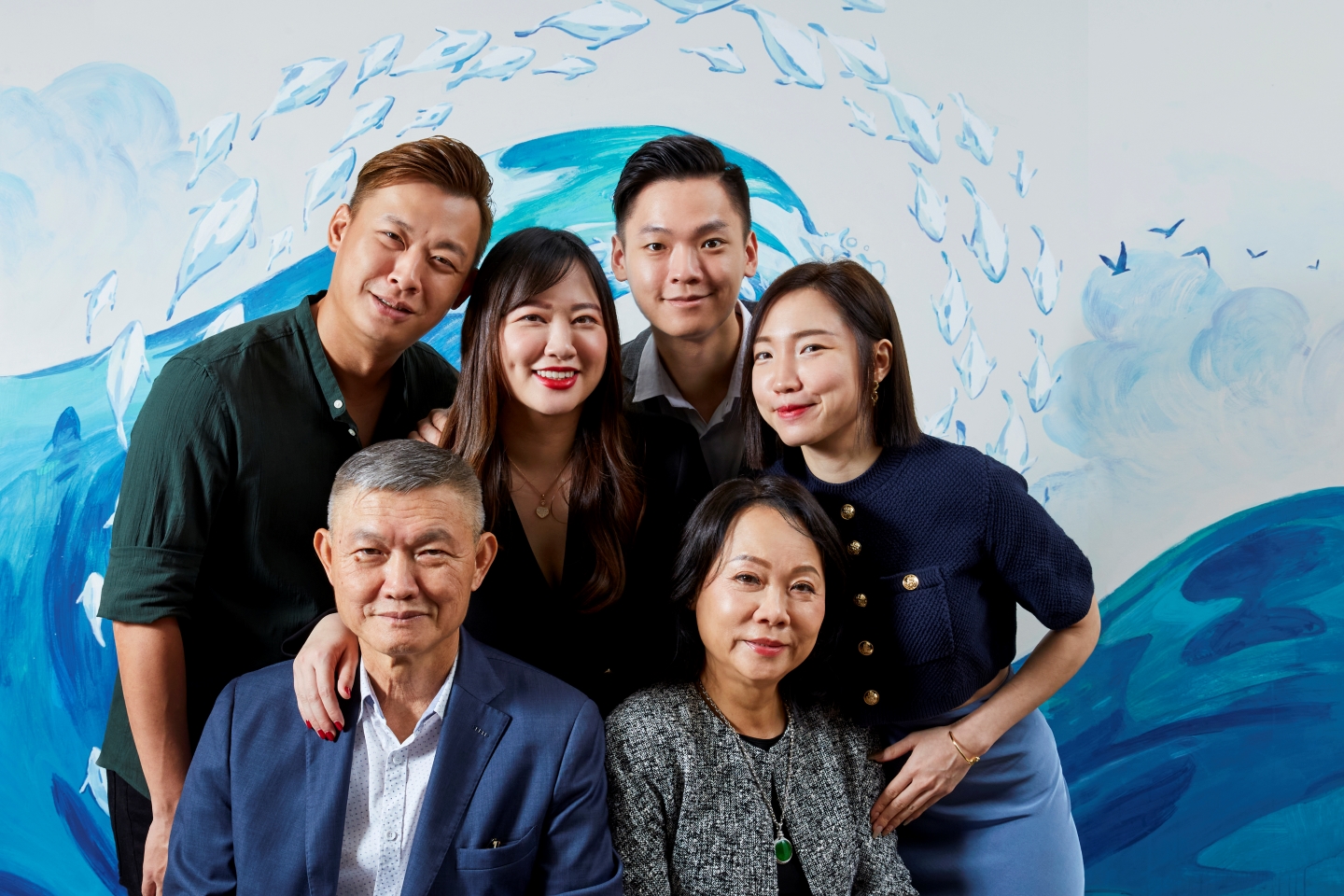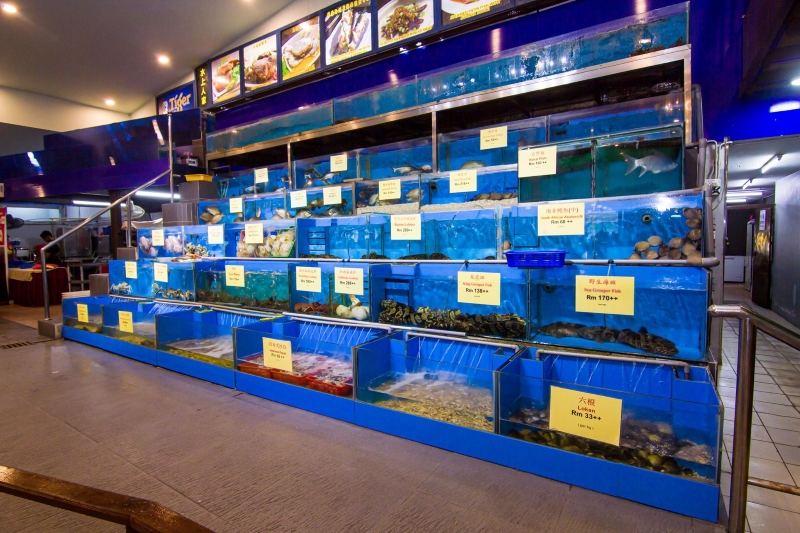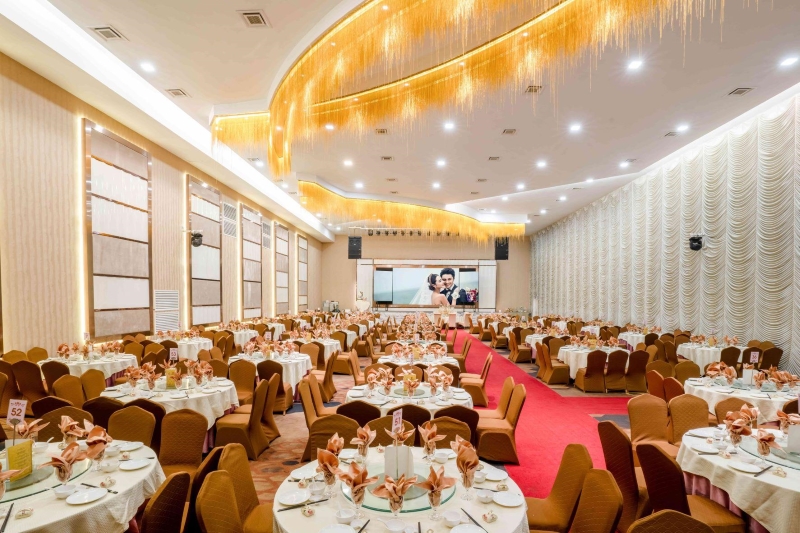
(Seated): Datuk Wong Keong Fook and Datin Kok Yoke Sim with (from left) Ken, Abby, Alex and Charlotte (Photo: SooPhye)
Unlike most men who proudly thrust out their hand to show off their latest timepiece, Datuk Wong Keong Fook waves both of his and cheerfully declares that he does not wear a watch. From habit, because he has spent years dipping his arms into aquariums to catch live seafood. “It was always wet and the seawater spoilt everything so I could not wear one,” Wong says. The times he did, he would take it out, put it somewhere and lose it, his wife Datin Kok Yoke Sim adds.
Catch them when they are not after fresh catch and the co-founders of Unique Seafood Group of Restaurants will recount how they have managed Weng Fatt Fresh & Frozen Seafood for more than 30 years, and set up their own food operations along the way.
More importantly, Wong, 65, was the first person to bring aquariums from the back of restaurants and place them right in front, to entice customers with their variety of seafood and boost sales. Talking about variety, he was also the first to bring Alaskan king crab, sturgeon and turbot into the country.
It all began when his father, who had migrated to Perak from Guangzhou, China, brought in fry and handed them to local farms to breed. Ipoh, his hometown, has lots of disused mining ponds and when the big head carp and grass carp had grown, he would buy them back from the farmers to sell at the market.
Number 11 in a family of 12 and one of eight boys, Wong moved to Kuala Lumpur to sell fish, leaving his brother to helm Weng Fatt, the family's supply company established in 1987. He and Kok were married by then, but she only joined him in KL many months later.
At the start, it was hard pushing what they sourced from abroad. People asked, “What is geoduck? This kind of thing can eat ah?”
They quickly learnt that the mortality rate of fish was high. Imported varieties stayed alive for about a week and those obtained locally, 10 days. There was also wastage as some perished on flights from lack of oxygen.
Another eye-opener was restaurant owners were not willing to fork out money for big tanks and did not want to take care of the fish.
img_2865_new.jpg

Each consignment of fish, crabs, prawns and lobsters they brought in was about 15 cartons, with each weighing 10kg.
The Wongs decided that instead of waiting for orders from hotels and eateries, and to minimise wastage, they could start a restaurant and sell what they have daily. Thus, Unique Seafood opened in 1999, first in Imbi, KL, before moving to its present premises at Section 13, Petaling Jaya. And how better to attract clients to select what they want than by showing them the creatures, live, in tanks placed strategically near the entrance — an idea they picked up from a visit to Hong Kong.
Kok remembers how she kept ordering what caught her eye at a restaurant there even though she could not finish eating the dishes. “I saw the live seafood and was happy. I thought, how can we bring them to Malaysia so everyone can try them?”
“We called our restaurant [by this name] because at the time, people didn’t even know about the different exotic varieties,” Wong says.
Seafood is lighter than meat and easy to digest. There are also more ways of cooking them than poultry. And there are seasonal catches, such as Scotland scam, which means a wider menu.
Husband and wife rolled up their sleeves and pants and started supplying restaurants with tanks and live catch, while running their own outfit. It was high-risk and hard work, but they threw themselves into it.
“Without the right expertise and experience, it is not easy to stay in this business,” says Kok. They have both, plus passion, and today own four outlets under the group. Unique Seafood PJ23 is a familiar landmark on Jalan Kemajuan. Elite Grand Ballroom offers a banquet-style experience for large company events and weddings, while Pantai Seafood Restaurant serves live fish and seafood and other dishes prepared in a home-cooked style. Atlantic Seafood Restaurant, the first such set-up at Tropicana Golf & Country Resort, is spread across 9,600 sq ft of space and can seat 210 people. It is a partnership between TGCR and Unique Seafood Group that promises diners a fresh and flavourful taste of the ocean.
Looking ahead, the Wongs are passing on more responsibility to their offspring, three of whom are already arms-deep in the family business. Yuen Ken, the eldest, has been learning the ropes for a long time and knows how the whole outfit works, from supply chain to food production. Alex (Yuen Lek) and Abby (Mun Yee)handle operations and sales and marketing, respectively, and are directors of Atlantic Seafood.
atlantic_13_-1-min.jpg

Older sister Charlotte (Sum Yee) has her own interior design company and did the decor for the group’s restaurants. Youngest brother Yuen Hang is 17 and doing his A-Levels.
Alex, 32, who joined the company after completing a double degree in restaurant management and marketing in Lucerne, Switzerland, was always certain where his heart lay. “From when I was seven, my parents would take me to the restaurants where they supplied seafood and I always played with the fishes and prawns. I knew from young that I wanted to take over and help them out.”
He and Abby were born in different months of the same year and sat side by side in school for years. They are very close but different in character.
“Alex is meticulous and detail-oriented, with a passion for F&B like none other. He was clear about his career goal from 13 or 14,” says Abby, who is strong on leadership and interpersonal skills. Unlike him, she wanted to explore her options after studying nutrition in the UK and international business in China and went into the pharmaceutical industry after returning home.
“Growing up, we didn’t have much family time or outings together as our parents spent all their days working and building the business. I remember being on my own after school, and seeing them coming back exhausted late at night.”
Eight years ago, roped in to help the family market its Chinese New Year campaign, her interest in food grew and “I realised my calling was in F&B, where the family belongs. My parents have worked very hard to forge success and I want to help them continue and expand”.
The siblings’ involvement has brought a breath of fresh air to the business in diverse aspects and directions. Schooled in the culinary arts in a country famed for hospitality education, Alex has enhanced standard operating procedures in the kitchen and is working with senior chefs to create new flavours and signature dishes.
Abby, meanwhile, is committed to rebranding the company from within. She is propelling it forward using digital media, and working on corporate partnerships and franchising the group’s brands and businesses, to achieve exponential growth in the next three years.
_s1a0076a.jpg

“I feel like we are only in the very niche Chinese market and just tapping the surface now.” They want to be more Muslim-friendly and target diners from that demographic with a smaller business model that is easier to replicate. “Like a seafood express that is fresh but fast,” Kok adds.
The siblings are taking things one step at a time to obtain the necessary certifications. Meanwhile, how do they plan to keep customers returning for more?
“Food is subjective for sure, but I don’t agree that people are always rushing for the next new thing. Like every brand, those that look shiny and creative on the outside but lack product fundamentals may attract customers in the short run, but will not be sustainable for long,” Abby says.
“Unique Seafood Group has been around for 24 years and weathered all kinds of ups and downs, from [changing] market trends to global catastrophes and recently, Covid-19. Yet, we stand strong and are recognised for offering the freshest live seafood you can find in the country.
“We believe the best and only way to keep customers coming back is by focusing on our unique selling point and core values — the quality, variety, freshness and flavour of our food, and customer service. As we expand, we believe in delivering the same values to different market segments that may or may not have experienced our brands.”
In recent years, new seafood restaurants have sprung up around the country and some existing set-ups find that threatening. Not Abby, though.
“We want to educate Malaysians on eating seafood and take pride that people now appreciate it. We don’t see other restaurants as competition. It’s like an achievement for us because we were the first to bring in live seafood.”
As a seafood vendor-cum-restaurant owner, how do they cope with unforeseen circumstances — like the food scare surrounding Japan’s release of treated radioactive water from Fukushima into the Pacific Ocean last year — and put consumers at ease?
“Weng Fatt Seafood, managed by our parents for more than 30 years, has been supplying premium seafood to international and local hotel chains, banquet halls and restaurants. With our experience, we can make quick decisions following global events and pivot, shifting the source of our live seafood as and when necessary.”
While external factors may impact day-to-day processes, the biggest challenge in running a business like theirs lies within the company itself, Abby thinks. Food production can be automated to some extent but not restaurant operations, which require reliable hands.
atlantic_seafood_restaurant.jpg

“Hence, our human talent is and will always be our greatest asset. Achieving consistency delivered by our people across all pillars reflects this, from maintaining the seafood to taking orders, cooking, serving, billing and marketing.
“Our mother used to tell us it is more important to manage our manpower in the organisation than the food itself. That’s why it is very important to always talk to the chef and the manager to make sure we have open communication and a strong team.”
It is sound advice because various staff have stayed with the company for decades and become like friends. During off-peak periods, especially after the Lunar New Year, the family has gone on holiday with their chefs, to eat and try other foods.
Wong believes it is crucial that restaurateurs know how to eat. His sons have been exposed to different cuisines from following them around and can tell whether what a place serves is good. “To be the boss, you need to know that.”
What the children have also learnt is mum and dad are more inclined to show than tell when it comes to work, Abby says. “They are not great with verbal lessons or imparting their knowledge directly. But instead of micromanaging, they trust and allow us to experiment with ideas and strategies, vowing to back us up no matter what. This has significantly driven our own personal and career growth, shaping us into the entrepreneurs that we are today.”
“They demonstrate and we learn from their actions,” Alex adds.
His sister is impressed by their parents’ sheer character, grit, tenacity and winning mindset — “a positive way of being kiasu that really inspires us. Like many family-owned businesses, they started from the ground up and have shown us we can forge our future with our bare hands”.
Does their old style of doing things clash with the new? “It would be a lie if I say no. They are also parents and sometimes talk to us that way. Generally, when there are things I don’t agree with, I try to understand.
“I feel at the end of the day, whatever happens at work, we are still family. We go home, sit down, have dinner together and talk. We don’t get angry for days.” Knowing how hard her parents have slogged for the family also makes her grateful.
unique_seafood_hall_07-min-min.jpg

Adding her thoughts on not always seeing eye-to-eye with her children, Kok says food is a tough business and she and Wong learnt the hard way, from their mistakes. “We want to protect them from making the same errors. We have the experience but don’t know how to teach them.”
As such, Unique’s partnership with TGCR is a timely opportunity to put Alex and Abby out there and learn something, she thinks.
The latter concurs with mum. “It’s good for us to work with someone else and not just ourselves, learn how a big place operates, get along with other staff and bring out ideas.”
Over a delectable lunch at Atlantic — there was the restaurant’s Signature Chili Indonesian Crab with Fried Bun, Steamed Live Tiger Prawn with Garlic and Vermicelli, Nyonya Steamed Fish, Salt & Pepper Crispy Oysters and Braised E-fu Noodles with Boston Lobster — the conversation meanders to what food signifies to the young Wongs.
Alex likes crab steamed with ginger and premium soy sauce for its real flavour. More the doer than talker, he recalls that while helping his father out during the weekends all those years ago, he was already thinking of a career in food. “I am used to hard work.”
Abby’s favourite is stir-fry lobster with cheese, a dish the family partake every Chinese New Year. For her, food is more than sustenance. “It’s a bridge between cultures, a canvas for creativity, a source of comfort and a catalyst for connection. It’s a reflection of our heritage, traditions and personal preferences.
“Food embodies memories, evokes emotions and brings people together in shared experiences. It’s a celebration of life, diversity and the joys of taste and texture. Ultimately, food is a fundamental part of the human experience, intertwining with every aspect of our lives.”
This article first appeared on May 27, 2024 in The Edge Malaysia.


